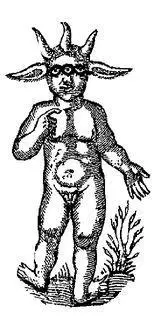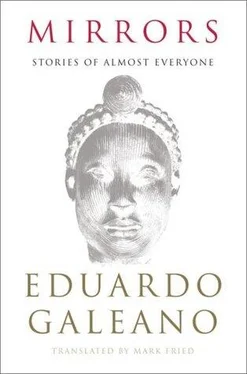“Under the banner of liberty, equality, and fraternity, France built more prisons than schools in our country.”
He had barely eluded the guillotine, and several times had been shackled and thrown in prison. His country remained imprisoned, but not for long, not anymore: that very morning in September 1945, Ho Chi Minh declared independence. Serenely, simply, he said:
“We are free.”
And he announced:
“We will never again be humiliated. Never!”
The crowd erupted.
Ho Chi Minh’s powerful fragility embodied the energy of his homeland, armed like him with pain and with patience.
From his cabin made of wood, Ho led two long wars of liberation.
Tuberculosis killed him before the final victory.
He wanted his ashes scattered freely in the wind, but his comrades mummified him and enclosed him in a glass sarcophagus.

During thirty years of war, Vietnam gave two imperial powers a terrific thrashing: it defeated France and it defeated the United States.
Here is the grandeur and horror of national independence:
Vietnam withstood more bombs than all the bombs dropped in the entire Second World War,
its jungles and fields were drenched with twenty million gallons of chemical defoliants,
two million Vietnamese perished,
and innumerable were the people mutilated, the villages annihilated, the forests razed, the lands left sterile, and the poisonings bequeathed to future generations.
The invaders acted with the impunity bestowed by history and guaranteed by might.
A belated revelation: in the year 2006, following nearly forty years of secrecy, a detailed nine-thousand-page report by the Pentagon became public. The report confirmed that all U.S. military units operating in Vietnam had committed war crimes against the civilian population.


In democratic countries, the overriding duty of the mass media is objectivity.
Objectivity consists of conveying the points of view of both sides of a conflict.
During the years of the Vietnam War, the mass media in the United States made the public aware of the stance of their government and of that of the enemy.
George Bayley, who is curious about such things, added up the time allotted to one side or the other on the television networks ABC, CBS, and NBC between 1965 and 1970: the point of view of the invading nation took up 97 percent, while that of the nation invaded got 3 percent.
Ninety-seven to three.
For the invaded, the obligation to suffer through the war; for the invaders, the right to tell the story.
The news makes reality, not the other way around.

In 1947, India became an independent country.
India’s big English-language newspapers, which had called Mahatma Gandhi “a ridiculous little man” when he launched his salt march in 1930, changed their tune.
The British Empire had erected a barrier of trees and thorn bushes, known as the Great Hedge, two thousand miles long, between the Himalayas and the coast at Orissa, to stand in the way of the salt of the earth. Free competition forbade freedom: India was not free to consume its own salt, even though it was better and cheaper than salt imported from Liverpool.
Over time, the hedge grew old and died. But the prohibition lived on, and against it marched a tiny, bony, nearsighted man who went about half-naked, leaning on a bamboo cane.
Mahatma Gandhi began his march to the sea leading a handful of pilgrims. Within a month, after a lot of walking, a multitude marched with him. When they reached the sea, each of them picked up a fistful of salt. By so doing, they broke the law. It was civil disobedience against the empire.
A few of the disobedient were shot and killed and more than a hundred thousand were imprisoned.
Imprisoned too was their country.
Seventeen years later, disobedience freed it.
EDUCATION IN FRANCO’S DAY

Flipping through his schoolbooks, Spanish writer Andrés Sopeña Monsalve found this:
• On Spaniards, Arabs, and Jews:
Let us loudly proclaim that Spain has never ever been a backwards country. Since the earliest of times Spain produced useful inventions such as the horseshoe, which it taught to the most advanced peoples on earth.
Though when they first came to Spain the Arabs were simple and ferocious desert warriors, contact with Spaniards awoke in them dreams of art and knowledge.
On several occasions, the Jews made martyrs of Christian children, torturing them horrendously. For all that the people hated them.
• On America:
One day a sailor named Christopher Columbus introduced himself to Doña Isabella the Catholic, saying he wanted to sail the seas and find what lands there were and teach all peoples to be good and to pray. Spain felt very sorry for those poor people in America.
• On the world:
English and French are such diluted languages that they are on the verge of completely disappearing.
The Chinese do not observe a weekly rest and are physiologically and spiritually inferior to other men.
• On rich and poor:
Since everything is covered in snow and ice, the little birds cannot find anything and now they are poor. That is why I feed them, and in the same way the rich maintain and feed the poor.
Socialism organizes the poor so they can destroy the rich.
• On the mission of Generalissimo Franco:
Russia dreamed of stabbing its bloody sickle into this beautiful corner of Europe, and all the communist and socialist masses of the earth, together with Masons and Jews, sought to triumph in Spain. . And then came the man, the savior, the Great One.
To give responsibility for running the state to the people, who have not studied or learned the complicated art of governing, is foolish and evil.
• On good health:
Stimulants, like coffee, tobacco, alcohol, newspapers, politics, movies, and luxuries, relentlessly undermine and wear down our organism.

On the uppermost part of the dais, wrapped in his black toga, sits the presiding judge.
To his right, the defense lawyer.
To his left, the prosecutor.
Steps below and still empty, the bench for the accused.
A new trial is about to begin.
Speaking to the bailiff, Judge Alfonso Hernández Pardo orders:
“Bring in the guilty man.”

In Cairo in 1951, fifteen hundred women invaded Parliament.
They stayed for hours and there was no getting them out. They shouted that Parliament was a lie because half the population could neither vote nor be elected.
Religious leaders, representing heaven, raised their cries heavenwards: “Voting degrades women and goes against nature!”
Читать дальше



















